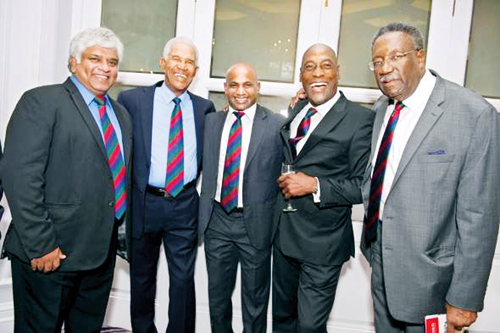Cricket’s captain dilemma — the ugly patchwork nobody likes
View(s):
Former Sri Lanka skippers Arjuna Ranatunga (L) and Sanath Jayasuriya (centre) with three former Windies cricket greats -- Sobers, Richards and Lloyd
It is rare–even unheard of–in the cricketing world for a team to have had five captains in two years. But Sri Lanka has not only shuffled its deck at will, it has changed captains fast and often in search of the elusive quick fix. And it has not worked.
Apart from five Test skippers, Sri Lanka has had six different captains in ODI cricket. If the story doing rounds is true, we will soon have a seventh taking the limited-over team to South Africa for our last assignment before the ICC World Cup in England.
This high captaincy turnover rate has only bred a greater sense of instability within the team, contributing hugely to Sri Lanka’s woeful performance across all formats in the last two years. Arjuna Ranatunga, World Cup winning skipper turned politician, says there is too much uncertainty and that this must change if the team is to move forward
“Once you select a captain, you need to back him regardless of the results he achieves,” he maintained. “For an instance, an ordinary team that loses a hard-fought series can be well led while a very good side that narrowly wins against a lesser opponent could be poorly captained. So we must look at the impact he has made rather than what the final results show.”
Ranatunga led Sri Lanka in 56 Test matches and 193 ODIs. He is spoken of in the same breath as Dr. W. G. Grace, Don Bradman, Sunil Gavasksr and Imran Khan for the influence he has had on Sri Lankan cricket. He was fearless on the field, had his own way of thinking and developed a team he felt was the best to take the game forward. The result was a World Cup win.
But for this, he was backed by the Board and Selectors in stark contrast to what is being observed in recent years when team composition has been frequently changed. Ranatunga said the captain must have freedom. The Board and Selectors had allowed him to devise his own strategy, set goals and marshal his troops to achieve those objectives.
“Do we find this today?” he asked. “Are we supporting the skipper to back his own players and to make decisions that he thinks are right? I don’t think so. This has created a huge mistrust among players which has hit their confidence.”
Sanath Jayasuriya flourished under Arjuna Ranatunga. A middle-order batsman with no real technique, he was promoted to bat at the top of the order despite there being every possibility that he would fail. But his captain gave him confidence and he retired as one of the greatest all-rounders in world cricket across formats.
“This is the support you need,” Jayasuriya said. “The Board needs to back their captain. Then, the captain can back his players. This is not happening today. So, what they do is to play for survival and not to win matches.”
Jayasuriya, who captained Sri Lanka in 38 Tests, was Chairman of Selectors twice. He said a captain must get to know his players, find out which ones react well to a pat on the back and which ones need a kick up the backside. This would require him to spend time with the players after hours.
“A captain demands 100 per cent from his players when they’re out on the field. He should return the compliment when it comes to the players’ off-field needs. This can trigger open discussions on cricket technique, personal problems and even financial issues,” Jayasuriya said, adding that this was how it was done during his day.
Peer respect is another essential component, he said. Sri Lankan cricketers recently became an international laughing stock when Thisara Perera raised questions about the ODI team’s leadership with Sri Lanka Cricket in the aftermath of a social media spat between him and captain Lasith Malinga’s wife. The divisions in the team were clear.
“Respect is not something you ask for or demand,” Jayasuriya said, referring to the ODI leadership. “You need to earn it. And when you don’t have the respect of your charges, you are in trouble. This is what has happened to us. So we need to identify someone who can command the respect of players and appoint him with a long-term goal. Continued failure will be disastrous for the country.”


